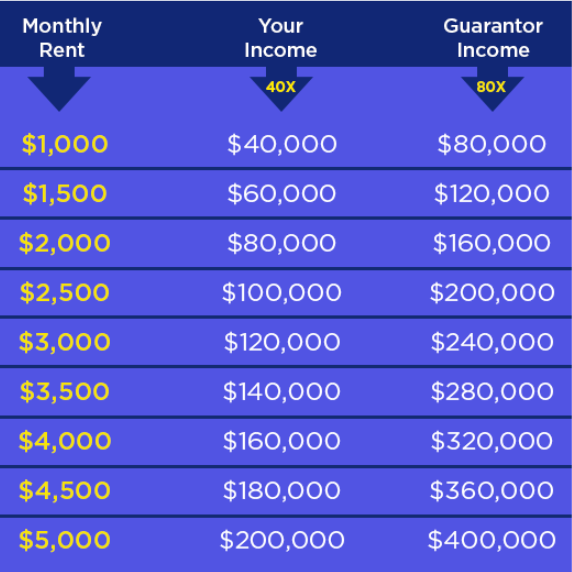When renting an apartment, the most important thing to consider is how much you can afford to spend on your rent. Most landlords require tenants to have an income 40x greater than their monthly rent payment. That’s a large sum of money, but it essentially breaks down to where you spend 30% of your income on their housing, leaving 70% remaining to cover living expenses, utilities, loan payments, etc.
To determine how much rent you can afford to spend on an apartment, divide your yearly income by 40. A potential renter with a $50,000 salary can afford to pay $1,250 monthly on rent. Refer to the below image for more quick calculations.

Want to know the exact amount to pay in rent? Use the RentHop Rent Calculator.
Due to the high volume of potential renters in New York City, landlords continue to require their tenants to make 40x the income, as they can usually find tenants who meet that requirement. However, many people rent in New York City do not make 40x their income. It is, therefore, not uncommon for New Yorkers to look for roommates to lower their monthly rent for an apartment. Some use a guarantor to help qualify for their apartment during the application process.
Finding a Roommate
While it may sound appealing to live alone, many renters in New York City will rent an apartment with a roommate or roommates at some point. When a one-bedroom or studio apartment grows expensive, a two or three-bedroom apartment typically becomes more affordable per person when split among a group. To cut costs, you may consider renting with friends and acquaintances or even those you find on online housing groups through websites like Facebook. Sometimes, word of mouth may also help secure a roommate.
Considering moving in with a roommate? Click here to read more about the process.
When applying for the apartment, landlords usually require that each renter make 40x their share of the rent, making living with roommates a more accessible option for those who cannot qualify to live independently.
For instance, suppose a group of renters look to share a four-bedroom with three roommates for $4,000 a month. Each roommate will be responsible for $1,000 per month. To meet the 40x income rule, each renter must make at least $40,000 per year to qualify for the unit.
Finding a Guarantor
If you don’t make 40x the monthly rent for an apartment, you can use a guarantor to help qualify. A guarantor is someone who applies for the apartment with the renter and legally agrees to pay the rent should a situation arise where the renter does not pay. Since guarantors become responsible for payment if the renter cannot afford the rent, they must meet a set of requirements and submit paperwork for the apartment with the renter.
Common groups of renters who use guarantors include:
- Recent college graduates
- Those with little employment history or no current employment
- First-time renters
- A non-resident of the United States
- Applicants with no credit history or a credit score below 650
- Those with an income less than 40x the rent
Guarantors must make 80x the monthly rent of the apartment and have a credit score above 700. These requirements are more strict than the renter’s, as the landlord wants reinforcement that they will receive rent should the renter not pay. Some landlords may also require that the guarantor lives in the state or nearby region to ensure they can track someone down if needed.
You may ask a family member or friend to be your guarantor. If you decide to ask someone you know, there are some tips and potential answers to questions this person may have:
- Ask politely! Start your conversation by asking the person if now is a good time or taking the time to schedule a conversation in advance. This way, the person knows you have something important to discuss and can adequately prepare.
- Provide as many details as possible on the rental process, the apartment (if you’ve found an apartment at this point), etc. If you can demonstrate your responsibility in the process and describe what has happened so far, where you are at, and what you need to move forward, you may have more success when asking for help. This potential guarantor may appreciate that you thinks ahead, and be more likely to help if they know the you also put in substantial effort.
- Make sure they know what kind of documentation they need to submit to decide if they’re comfortable with it. Provide the guarantor with a written list for their reference and then walk through each item if it requires more explanation.
- Tell them they can send the necessary documents directly to the agent or landlord if they feel uncomfortable sharing sensitive information with you. Some applications may even have a portal where the guarantor can directly upload their documents.
To speed up the process when looking for an apartment, consider finding a guarantor before beginning the search and ask them to compile the necessary documents ahead of time. They can put all their papers into an online folder and either share it with the you directly, or wait to share it with the agent or landlord when the time comes.
Online Guarantor Services
Sometimes, you may not know someone who can serve as your guarantor. In this case, you can utilize an online guarantor service, like Rhino. The service works as a guarantor and will become legally responsible for paying the rent if you do not pay. However, you will need to pay for this type of guarantor service. With this service, you typically have the option to pay a small monthly fee for the duration of their lease, breaking it down into manageable payments.









